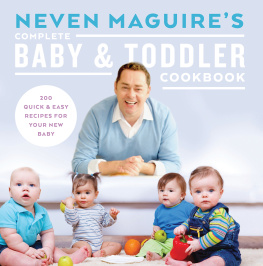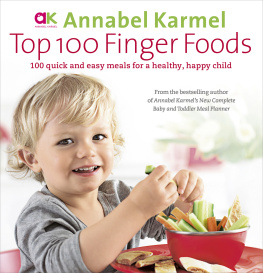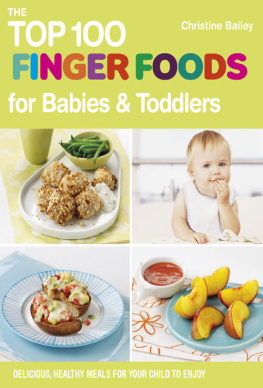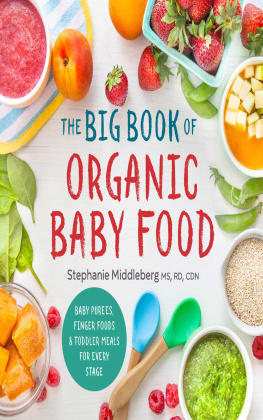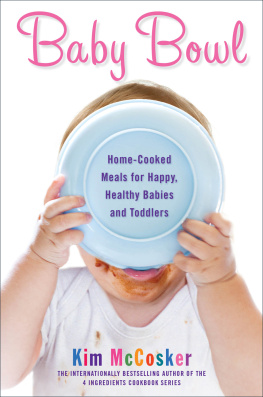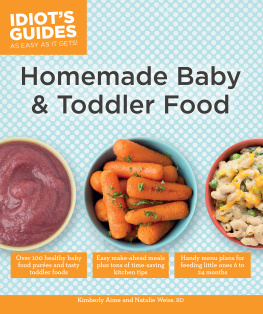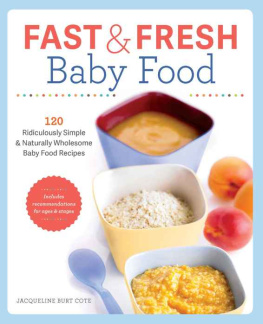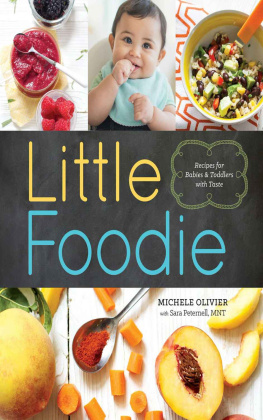NEVEN
MAGUIRES
COMPLETE
BABY &
TODDLER
COOKBOOK
GILL & MACMILLAN

DEDICATION
This book is dedicated to our twins, Connor and Lucia. I love cooking for you at home and I know we will have a lot of fun with these recipes!
All baby and toddler recipes supported by

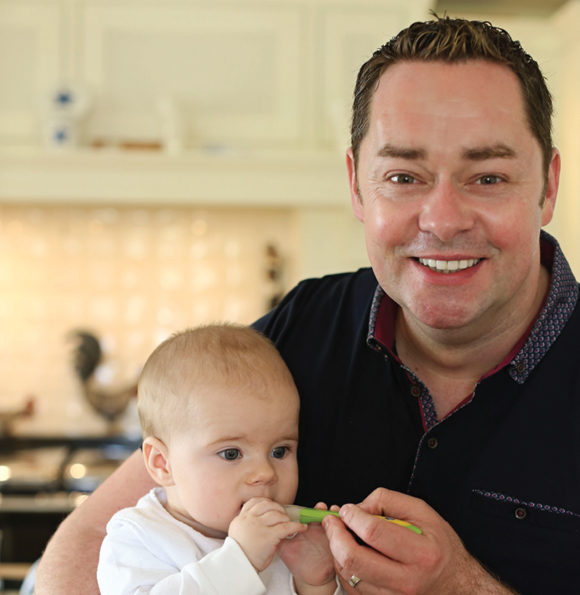
CONTENTS
INTRODUCTION
AS A BUSY WORKING DAD, my family inspires my food habits. I try to feed my twins, Connor and Lucia, healthy, nutritious food whenever possible. It is something that I am passionate about: good nutrition is the most important investment you can make for your childs future.
But starting out is always daunting for any parent.
There are so many questions about when to wean, which foods to offer first, which ones to avoid yet our parents and grandparents seemed to sail through the process! I learned my love and respect of good food from my mother; spending time in her kitchen was an education. To anyone who asks me at my demonstrations how they can instill a love of nutritious food in their children I always answer the same way: education. First, equip yourself with the basics about seasonal ingredients, local produce and cooking. Then encourage your little one from a very young age to be involved with food: from shopping and preparing to helping out with cooking when the time is right.
Offering your baby and toddler a nutritious diet now will stand to them for the rest of their lives. Getting the right nutrition for babies and toddlers can ensure a lifetime of good health, reducing the risk of obesity and heart disease and even improving skills such as reading and writing. Through my role as ambassador for First 1,000 Days, I have learned a lot about the impact that good nutrition can have on the long-term health of children, so all weaning and toddler recipes have been reviewed and approved by First 1,000 Days. My hope is that this book combines traditional common sense and wholesome ingredients with the very latest nutritional advice on what is best for your baby from 6 months through to toddlerhood.
My wife Amelda and I know how hard it can be for families with young children to consistently provide the best nutrition. Parents want to do the best for their kids, but its not easy to cook and, at that, to cook healthily. Were still new to this, but we wanted to share what weve learned along the way.
Now Connor and Lucia eat what we eat. I love it when the twins try something new and come back for more. Watching their tastes evolve is very satisfying; its so important that children are exposed to a wide range of foods at an early age so that their taste buds develop in a healthy way.
I hope that this book will be a trusty guide that will take you from your babys first tastes, through all the stages of weaning, right up to family mealtimes and beyond.
Wishing you and your family a life-long love of good eating!
From our kitchen to yours,
Neven

STAGE 1 (ABOUT 6 MONTHS):
RUNNY FIRST PURES
WHEN TO WEAN
The Food Safety Authority of Ireland (FSAI) recommends that babies are weaned at about 6 months of age, but no earlier than 17 weeks. However, weaning should not be delayed beyond 6 months. Of course, every baby is different, so look out for the signs:
- No longer seems satisfied with a full milk feed.
- Demands increasingly frequent milk feeds over a period of time over one week.
- Usually sleeps well at night and naptimes, but is starting to wake up earlier and earlier.
- Starts taking an interest in food may be reaching out for food and begins to watch other people eating.
- Well able to sit up with support and head control is evident.
- Chews on hand and dribbles more frequently.
I think a parents instinct is very powerful, so if you feel your baby is ready, youre probably right. However, if your baby doesnt seem interested after a couple of attempts, you could always leave it another few days and then try again. The FSAIs guidelines on weaning in the table opposite are quite helpful.
THE STAGES OF WEANING
The weaning process takes place in three stages, starting with the first spoon feeds when the baby is between 4 to 6 months old and finishing at 12 months. Babies who start weaning at 6 months will move through Stage 1 more quickly than babies who start weaning at a younger age, meaning that Stage 1 may only last about two weeks for some children. If your child is ready for weaning before 6 months, I have included lots of extra options in the meal planner to help you out.
WORRIED ABOUT ALLERGIES?
Never avoid particular foods due to a suspected food allergy or intolerance. This can lead to a restricted diet and a poor intake of important nutrients. All allergies must be diagnosed by a doctor.
GLUTEN
Gluten is a type of protein found in wheat, rye, barley and oats. Gluten should be introduced gradually in tiny amounts at about 6 months of age, increasing the amount and frequency slowly over the next 46 weeks.
STAGES OF WEANING | FOOD TEXTURES APPROPRIATE DURING EACH STAGE OF WEANING | SKILLS LEARNED THROUGH EACH STAGE OF WEANING |
STAGE 1
From about 6 months of age | First foods should be thin pures, which will get thicker as the infant progresses. | Taking foods from a spoon Moving food from the front to the back of the mouth for swallowing Managing increasingly thicker pures |
STAGE 2
Between 6 and 9 months (as long as stage 1 has been completed) | Move from thick pures to mashed foods to foods with soft lumps and finally to soft finger foods. Infants should be drinking from a cup at this stage. | Moving lumps around the mouth Chewing lumps Self-feeding bite-sized pieces of soft food using hands and fingers |
STAGE 3
Between 9 and 12 months | Move to minced and chopped family foods. More textured finger foods should be offered. A non-lidded beaker should be used for all other drinks other than breastfeeds. If an infant is being formula fed, they should no longer use a bottle by the age of 12 months. | Chewing minced and chopped foods Self-feeding bite-sized pieces of soft food using hands and fingers Learning to eat with a spoon Drinking fluids from a cup |
THE ORGANIC DEBATE
Whether to feed your child organic food or not is a question many parents ask when theyre beginning the weaning process. At present there is no definitive scientific evidence that pesticide levels in ordinary foods are harmful, and organic foods are not nutritionally superior to non-organic foods, but some people choose to eat organic produce as a personal preference. It can be an environmentally friendly option, particularly when the food is grown in Ireland, but its undoubtedly more expensive, so its really up to you as a parent.

